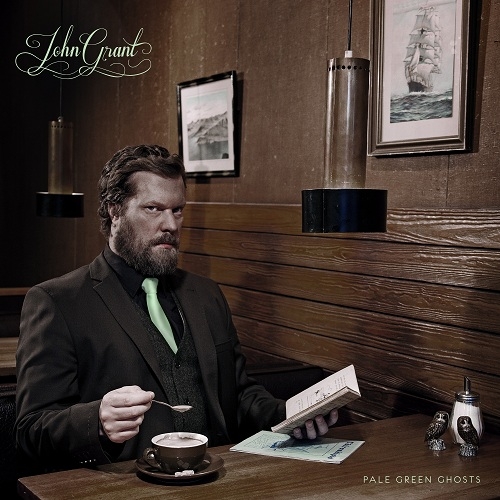For some, the problem with John Grant’s second solo album will be the absence of Midlake. Grant’s Queen of Denmark was, after all, deemed the best album of 2010 by Mojo, largely because of the lovingly arranged production from Tim Smith and band. Midlake’s work incorporated a double hit of 70s pop – folk-rock was on board with the flutes and moody piano, as well as the synth elements of, say, Todd Rundgren. Add Grant’s hugely sonorous voice and you have a mixture that couldn’t possibly fail to impress that Mojo audience. Then there was his incredible gift for writing simple yet moving melodies, and the intensity and sincerity of his sense of misanthropy, alienation and longing. In short, it was honest, and it recalled music’s most ‘golden’ of years: score.
But like I say, there’s no Midlake this time, and the album is naturally different. Grant is uncompromising in demonstrating where he is at now by opening the album with a title song that moves with a propulsive electronic track, not exactly dance-worthy but still influenced by ambient and classic disco, and paying worthy tribute to Prince’s Sign o’ the Times. Following it is ‘Blackbelt’, in a similar vein, making for a mildly disconcerting introduction to the album considering where Queen of Denmark left off, but repeated listening allows these two to grow into something quite intriguing, and Grant’s new identity takes shape.
Both offer lyrical imagery somewhat more abstract than his usual direct pining/angry abuse, the ‘pale green ghosts’ being the trees he would drive past at night, lit up by his car’s beam, when living in Colorado. In addition, both tracks build out of their minimalism to climaxes that happily steer clear of anything overblown and overdramatic – the controlling influence perhaps of Icelandic producer Biggi Veira (Grant’s living in Iceland apparently being the biggest factor in the switch in styles). He may not be breaking this electro departure of his to us too gently, but the depths that they offer signify it is not just a whim.
It isn’t until the acoustic guitar of the vitriolic ballad ‘GMF’ that the Grant recognisable from Queen of Denmark, and indeed The Czars, emerges. Here, he asserts he is "the greatest motherfucker that you’re ever gonna meet" over his trademark luscious chords, the subject matter here picking up the sad self-recriminations from his first album. The rest of the album is a balance between this style, such as the lovely ‘It Doesn’t Matter To Him’ and ‘Vietnam’ and some slightly manic electronic excursions – the terrific ‘Ernest Borgnine’ is one, as is the bizarre disco-rap of ‘Sensitive New Age Guy’.
It is sometimes said that an album of personal confession or emotional catharsis can only be done once, and to repeat it is to wear out and belittle that source of material. Grant is different however, with Pale Green Ghosts not letting up with the tales of agony and insecurity. But rather than lathering on this emotional gloop to the point of exhaustion and mawkishness, in his hands it seems less gauche, thanks in part to his wit: Richard Burton and Woody Allen emerge as characters, and many of his horrors are described firmly with tongue in cheek.
The songs of depression, shame and regret persist – something directly alluded to on ‘It Doesn’t Matter To Him’, one of two stunners on the album that refer to his ongoing guilt over his sexuality: "I should have practiced my scales / I should not be attracted to males". The other is the last track, ‘Glacier’. Like ‘Caramel’ from Queen of Denmark, Grant steps back from himself to express a softer, more compassionate approach to dealing with rejection and self-loathing. An extremely emotive chorus ensures the album closes on a less bitter note, which is nice.
The elephant in the room, so to speak, on the release of Pale Green Ghosts, is the fact Grant was diagnosed as HIV positive in early 2011. It’s likely the songs were written before then, yet the fact still lends an added resonance to many of them, such as ‘You Don’t Have To’ and particularly ‘Glacier’. Otherwise, the issue is irrelevant to the record, although the fact he talks openly about his diagnosis in interviews and on stage suggests it may be a factor on any third album.
John Grant’s songs can be characterised by extreme restlessness and the state of suffering mental and physical discomfort within one’s being. The irony and often confronting honesty he brings to these problems ensure Pale Green Ghosts is extremely engaging and often engrossing. But Queen of Denmark it is not, which will hopefully not put off the Fleet Foxes and Jeff Buckley fans who were so thrilled with that first collection. His second is branching out into the more experimental, atmospheric and even psychedelic – it’s a more challenging task but one that perhaps ultimately yields richer rewards.


